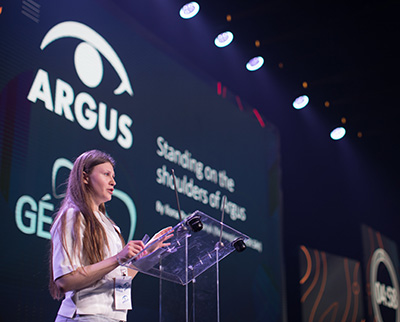
GÉANT Learning and Development
Supporting excellence, professional growth, discovery and knowledge sharing of networking professionals
The GÉANT Learning and Development Team (GLAD) work alongside the community to help promote learning and development activities in numerous ways. From designing and delivering training, to assisting subject matter experts in reaching their audience with engaging and insightful material.
The GLAD team are passionate about learning and run a portfolio of services that are designed to inspire, imagine and deliver the research and education network of the future.
To find out more about GÉANT Learning and Development opportunities contact GLAD.
Course Catalogue
GLAD eAcademy
The GLAD eAcademy is an online learning space created by the community for the community. It is continually growing with technical and personal development courses.
The Network Automation eAcademy offers a series of courses aimed at the development of technical knowledge and skills associated with managing complex IT-related tasks and workflows.
Future Talent Programme
GLAD, together with GÉANT NREN partners, offer programmes that facilitate engagement with students and career-seeking professionals.
These programmes exist to introduce a future generation of talents to the GÉANT community and vice versa.
Find out more about the Future Talent Programme.
Trust and Identity Incubator Mentorship (TIM)
TIM provides IT and network students with a special interest in Trust and Identity (T&I) a chance to join the development of cutting-edge solutions in the field of T&I.
The programme takes place in the form of a six months’ internship at a local European NREN who is part of the GÉANT project.
Find out more about Trust and Identity Incubator Mentorship.
GÉANT.tv
This is available to everyone and is a point of access to video resources created as part of capturing and sharing the GÉANT community’s knowledge.
At GÉANT.tv you will find a wealth of infoshares and talks on various community projects.
What we do
We believe that businesses and individuals thrive when they are actively engaged in learning. Through our learning services we want to provide everyone with the opportunity to be inspired, grow and develop.

Training Design
Working with our partners we identify the best training design solutions tailored to specific needs.
We provide the skills and expertise to plan these solutions, and assist and upskill subject matter experts in the creation of their own learning and development material.

Training Delivery
Training courses can be delivered by ourselves, or we can share skills and offer guidance to help our partners, and subject matter experts, deliver engaging and informative training themselves.
Whether remote or in person, we can support partners in the organisation and promotion of infoshares and other learning events.

Learning Consultancy
Through our learning consultancy we provide advice and support when a partner is seeking a training solution or learning pathway.
We can also help source the best external provider for qualifications or skills based courses, and provide suggestions on training options based on our extensive experience.



